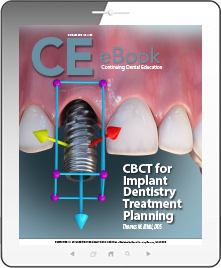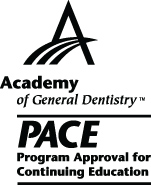CDEWorld > eBooks > CBCT for Implant Dentistry Treatment Planning


ADA CERP is a service of the American Dental Association to assist dental professionals in identifying quality providers of continuing dental education. ADA CERP does not approve or endorse individual courses or instructors, nor does it imply acceptance of credit house by boards of dentistry. Concerns or complaints about a CE provider may be directed to the provider or to ADA CERP at www.ada.org/cerp/

Approved PACE Program Provider. FAGD/MAGD credit. Approval does not imply acceptance by a state or provincial board of dentistry, or AGD endorsement. 1/1/2023 to 12/31/2028. ID # 209722.
eBook
Released: Monday, October 15, 2018
Expires: Friday, April 30, 2021
CBCT for Implant Dentistry Treatment Planning
By Thomas M. Bilski, DDS
Commercial Supporter: HDX WILL
An approach that comprises virtual treatment planning using cone-beam computed tomography (CBCT) followed by guided surgery has numerous benefits. In combination with laboratory treatment-planning software and a guided-surgery approach, CBCT allows clinicians to use flapless implant placement, which is less invasive and associated with high patient satisfaction, reduced patient discomfort, and improved soft-tissue outcomes.
LEARNING OBJECTIVES:
-
Compare the limitations of 2D traditional images with the accuracy of 3D CBCT images.
-
Determine when it is appropriate to provide endodontic therapy or to extract.
-
Develop a treatment that considers alternatives to traditional therapies and the long-term successes of such therapies.
-
Develop treatment plans based on what the patient presents and the patient's willingness to undergo therapy.
-
Recognize the minimum physiologic dimensions required for successful long-term implant dentistry.
About the Author
Thomas M. Bilski, DDS, Private Practice, Independence, Ohio
Download FREE eBook now!

